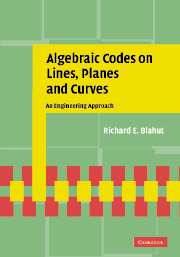Book contents
- Frontmatter
- Contents
- List of figures
- List of tables
- Preface
- Dedication
- 1 Sequences and the One-Dimensional Fourier Transform
- 2 The Fourier Transform and Cyclic Codes
- 3 The Many Decoding Algorithms for Reed–Solomon Codes
- 4 Within or Beyond the Packing Radius
- 5 Arrays and the Two-Dimensional Fourier Transform
- 6 The Fourier Transform and Bicyclic Codes
- 7 Arrays and the Algebra of Bivariate Polynomials
- 8 Computation of Minimal Bases
- 9 Curves, Surfaces, and Vector Spaces
- 10 Codes on Curves and Surfaces
- 11 Other Representations of Codes on Curves
- 12 The Many Decoding Algorithms for Codes on Curves
- Bibliography
- Index
1 - Sequences and the One-Dimensional Fourier Transform
Published online by Cambridge University Press: 05 October 2009
- Frontmatter
- Contents
- List of figures
- List of tables
- Preface
- Dedication
- 1 Sequences and the One-Dimensional Fourier Transform
- 2 The Fourier Transform and Cyclic Codes
- 3 The Many Decoding Algorithms for Reed–Solomon Codes
- 4 Within or Beyond the Packing Radius
- 5 Arrays and the Two-Dimensional Fourier Transform
- 6 The Fourier Transform and Bicyclic Codes
- 7 Arrays and the Algebra of Bivariate Polynomials
- 8 Computation of Minimal Bases
- 9 Curves, Surfaces, and Vector Spaces
- 10 Codes on Curves and Surfaces
- 11 Other Representations of Codes on Curves
- 12 The Many Decoding Algorithms for Codes on Curves
- Bibliography
- Index
Summary
An alphabet is a set of symbols. Some alphabets are infinite, such as the set of real numbers or the set of complex numbers. Usually, we will be interested in finite alphabets. A sequence is a string of symbols from a given alphabet. A sequence may be of infinite length. An infinite sequence may be periodic or aperiodic; infinite aperiodic sequences may become periodic after some initial segment. Any infinite sequence that we will consider has a fixed beginning, but is unending. It is possible, however, that an infinite sequence has neither a beginning nor an end.
A finite sequence is a string of symbols of finite length from the given alphabet. The blocklength of the sequence, denoted n, is the number of symbols in the sequence. Sometimes the blocklength is not explicitly specified, but is known implicitly only by counting the number of symbols in the sequence after that specific sequence is given. In other situations, the blocklength n is explicitly specified, and only sequences of blocklength n are under consideration.
There are a great many aspects to the study of sequences. One may study the structure and repetition of various subpatterns within a given sequence of symbols. Such studies do not need to presuppose any algebraic or arithmetic structure on the alphabet of the sequence.
Information
- Type
- Chapter
- Information
- Algebraic Codes on Lines, Planes, and CurvesAn Engineering Approach, pp. 1 - 55Publisher: Cambridge University PressPrint publication year: 2008
